Table of Contents
In a landmark judgment, the Supreme Court has declared that passing the Central Teacher Eligibility Test (CTET) is now mandatory for promotions of government teachers from Primary (PRT) to Trained Graduate Teacher (TGT) posts. This decision will have a direct impact on lakhs of teachers across India, as it sets a clear benchmark for career progression in the education sector.
Supreme Court’s Historic Judgment for PRT TGT Teacher
The ruling came after multiple petitions from different states were clubbed together. The Court upheld the National Council for Teacher Education (NCTE) guidelines, making CTET a binding condition for promotions. At the same time, the Court provided a balanced approach:
- Teachers appointed before the implementation of the Right to Education (RTE) Act who have less than five years of service left will be exempted from CTET. They can complete their service without qualifying.
- Teachers with five or more years of service remaining have been given two years to clear the CTET and meet the eligibility requirements.
- Those unable to qualify within this period will lose the right to continue in such promoted posts.
- This clarity from the Supreme Court is expected to resolve long-standing disputes that have stalled promotions since 2017 in states like Uttar Pradesh.
CTET Admit Card 2026 – Click to Download
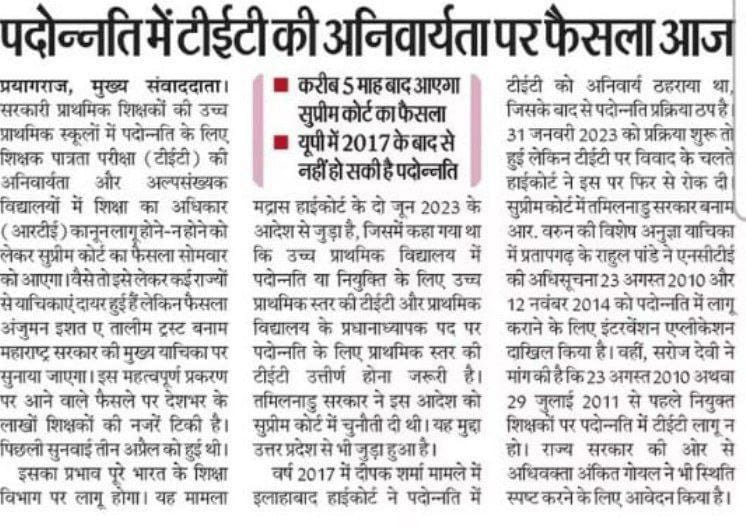
Key Highlights of NCTE Affidavit in SC
Laws and Rules
- NCTE Act, 1993 – This law gave the National Council for Teacher Education (NCTE) the authority to decide minimum teacher qualifications.
- 2001 Regulations – NCTE fixed the minimum educational qualifications required for teachers.
- RTE Act, 2009 – Under Section 23, NCTE was declared the “Academic Authority” to set teacher eligibility rules.
- Notification dated 23 August 2010 – From this date, it became compulsory to pass the TET (Teacher Eligibility Test) to be appointed as a teacher for Classes I to VIII.
- 2014 Regulations – TET was made mandatory not only for new recruitment but also for promotions.
- 2017 Amendment – All in-service untrained teachers were required to complete their training by 31 March 2019.
Status of Teachers Appointed in Different Time Periods
- Appointed before 3 September 2001 – Exempted from the minimum qualification rules.
- Appointed between 3 September 2001 and 23 August 2010 – Considered qualified under the 2001 Regulations, no TET required.
- Appointed between 23 August 2010 and 29 July 2011 – Must clear TET, since the RTE Act had come into effect.
- Appointed after 29 July 2011 – Mandatory to qualify for TET as per revised rules.
NCTE’s Current Stand
- Teachers appointed before 2001 are not affected.
- Teachers appointed between 2001 and 2010 remain valid under the 2001 Regulations, without TET.
- Teachers appointed after 2010 must clear TET for both recruitment and promotions.
- In-service untrained teachers were required to meet minimum qualifications by 31 March 2019; otherwise, they could not continue in service.
Key Takeaways
- TET has been compulsory since 23 August 2010 for teachers of Classes I-VIII.
- From 2014 onward, TET is also mandatory for promotions.
- No more relaxations or exemptions will be given, especially for teachers teaching Classes I-VIII.
Why This Verdict Matters?
The decision settles years of legal confusion and conflicting High Court orders. For example, in 2017, the Allahabad High Court had made TET mandatory for promotions, which froze the process in Uttar Pradesh. Later, in 2023, the Madras High Court also held that promotions to upper primary schools required passing the corresponding TET. The Tamil Nadu government challenged that order in the Supreme Court, bringing the issue to a national platform.
Now, with the Supreme Court’s intervention, the rules are uniform across the country. It establishes CTET not just as an entry-level exam but also as a standard for career advancement in teaching.
Impact on PRT and TGT Teachers
The ruling directly affects lakhs of teachers who have been waiting for promotions. For many, it sets a clear roadmap: either qualify for CTET within the given timeline or risk losing eligibility for higher posts. At the same time, it protects those nearing retirement by exempting them from additional requirements.
This verdict is also a reminder that educational reforms, especially those linked to teacher quality, will continue to be closely tied to national eligibility standards like CTET.
What’s Nect for PRT and TGT Teacher?
The detailed judgment is yet to be fully uploaded, which may provide further clarifications. But one thing is certain: teacher promotions in government schools will now be inseparably linked with CTET.

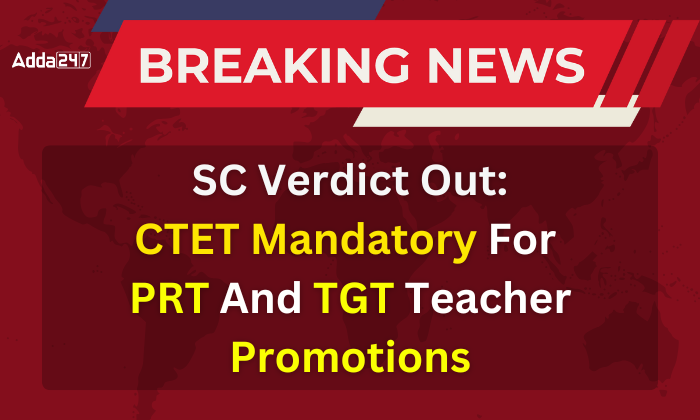


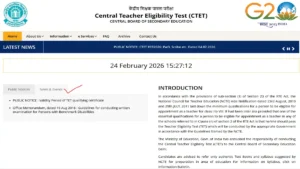 CTET Answer Key 2026 (Paper 1 & 2) P...
CTET Answer Key 2026 (Paper 1 & 2) P...
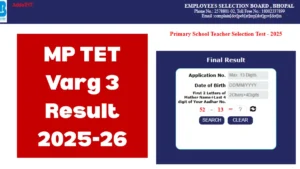 MP TET Varg 3 Result 2025-26 Out, Downlo...
MP TET Varg 3 Result 2025-26 Out, Downlo...
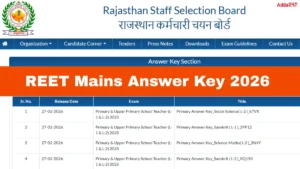 REET Mains Answer Key 2026 Out @rssb.raj...
REET Mains Answer Key 2026 Out @rssb.raj...













